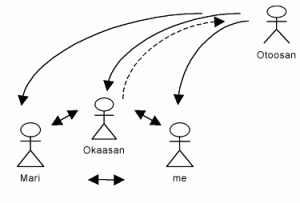In the Homestay Gallery you will meet fourteen homestay guests whose diary entries report their homestay experiences. All the Gallery cases have something in common: each guest changed his or her position vis-a-vis the host family between the time they entered and left the homestay. These changes were not problem-free, and often involved the very difficulties that torpedoed Peter’s homestay with the Sasakis in Part 1. The major difference between the failure depicted in the Peter/Saski homestay and the successful transitions in these cases was the guests and hosts’ responses to the problems they encountered. In the Gallery cases the problems actually created the momentum that propelled the guests away from their entry points.
The next three modules (8-10) focus in more tightly on the Gallery cases to pinpoint the hazards that were commonly faced, and to let you see how they were negotiated. Each of the modules is organized around a cultural hazard that had to be negotiated in every homestay. Each examines the various ways in which different guests (and their hosts) managed to negotiate this barrier, as well as the changes in the guest/host relationship that this produced. These three modules will help you grasp how you can use the cultural hazards you will encounter as opportunities to propel you forward, rather than obstacles that keep you mired at your entry point.
The final module brings to life everything in Part 3 that is discussed above by showing you how a specific cultural child— Molly—whom you met in the Gallery above, manages to navigate all the hazards depicted in Modules 8-10. This animated segment shows you a dynamic process, whereby each hazard Molly overcomes then propels her forward (to encounter—you guessed it—yet another hazard!). You will see how these movements form a sequence of steps which take Molly from entry point ‘I’ to ‘uchi‘. This also spells out the process by which Molly grows to cultural adulthood. Because the learning process is cumulative it is necessary to start at Module 8.1 and move through the sections in order.












































